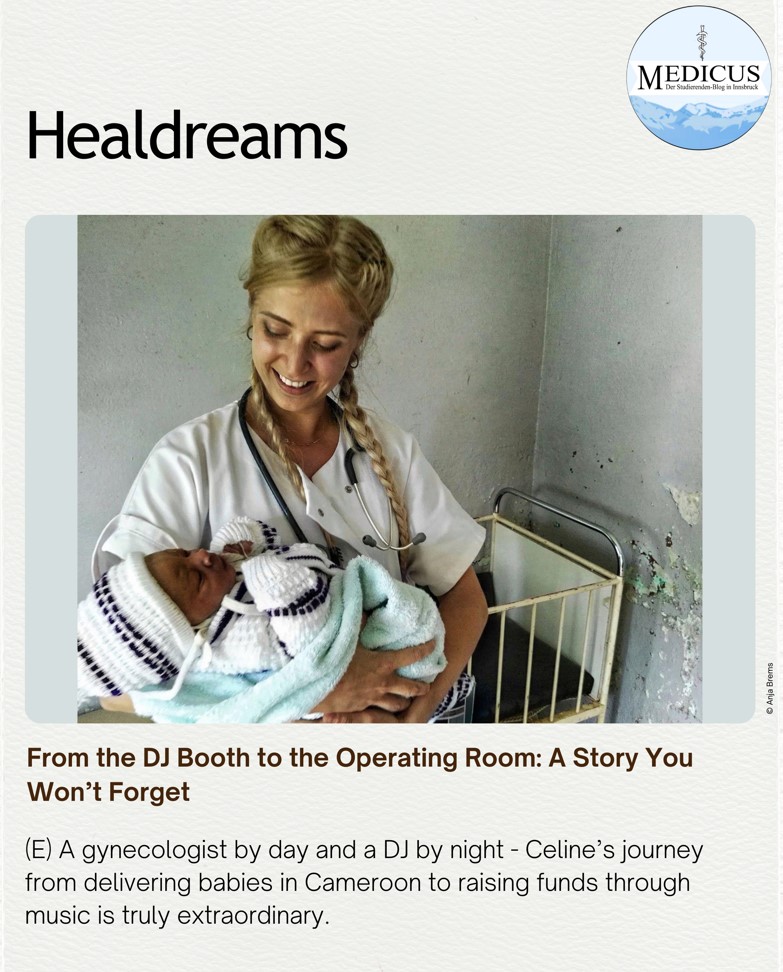
Healdreams

Deep deep in my soul, deep deep in my soul, deep deep deep…Technohouse beats and melodic sounds carry a wild raging crowd of young ravers almost meditatively on a cloud of happiness and love, while the sun stretches its first morning rays full of power and warmth through light trees and the artistically designed stage. Between the dancing hands and the breaks of the fog machine, I recognize the DJn at the DJ booth, a petite elfin creature who rounds off the magical atmosphere with her appearance and spirit.
Two months later I’m sitting in a Zoomcall in my shared flat in Innsbruck, opposite me Celine aka DJn Healdreams. Celine is a gynecologist in Lausanne and for a few years now she has been bringing her passion to the stage as a DJn to support humanitarian projects with the earned money. When I heard about her story, I knew I had to meet Celine and definitely wanted to share her story.
During college, Celine was able to travel to Cameroon for an internship. It was one of the most formative times of her studies and also the place where she made the decision to become a gynecologist. She experienced not only her first birth there, but also many other emotionally poignant moments. Most, however, were marked by poverty and the lack of means and resources.
„One hospital and everything is very different there. There is hardly any staff. The sick people are taken care of by the family, they are then all in one big room, they cook there, they sleep there, they go to the toilet there.“
In the „hospital“ where she was working, there was a general practitioner, a surgeon and a gynecologist. If one of the three doctors was out or busy, there was no substitute. There were nurses working there, obstetricians, and for nursing care, the family came. When Celine arrived on the first day, she was given the duties of the general physician, whom she was to substitute for the following week. Unimaginable for us, but in Cameroon this is everyday life.
Fortunately, the nurses in hospitals like these have a lot of experience outside their field, as they also have to perform surgeries every once in a while when there is a shortage of a doctor. So the situation could be solved well as a team according to the circumstances, but still the solution was far from optimal and Celine felt anything but ready for it.
However, there is not only a lack of staff, but above all a lack of materials. „When I was in surgery, I was given a mask for the operation. When the next surgery came up, I asked the surgeon for a new mask. He replied to me, ‚I already gave you a mask. This one will have to do for the next 4 weeks.“ As she tells me situations like this and other details of the medical conditions, I get a clearer picture of how people live there. I understand more and more why in a country like Cameroon, life expectancy is so low and infant mortality extremely high.
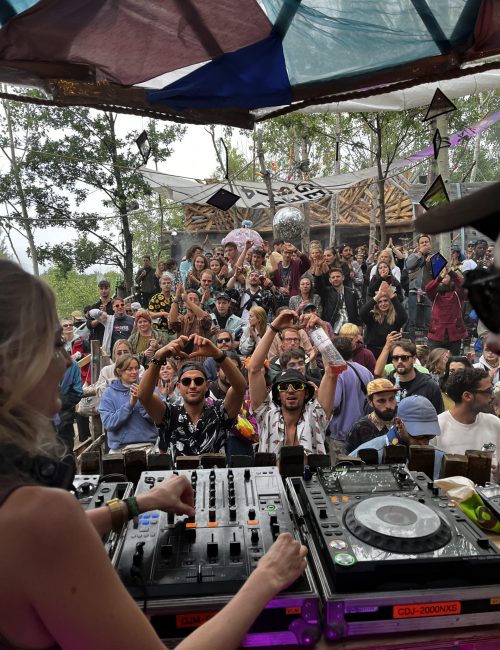
Swiss DJn Healdreams performing for a crowd © Anja Brems.
Day after day, Celine experienced new challenges that pushed her to the limits of both her skills and her psyche. „It was so intense, I loved it, was able to learn a lot, but at the same time it was so traumatizing. One night, a woman was taken to the hospital. She was pregnant and when she arrived she was already dead. The nurses woke me up to help the woman give birth, but she was already dead, she was already cold. The whole family was standing in front of me expectantly, their eyes were on me, I was supposed to save the woman and the baby. So I did cardiopulmonary massage to do anything, but I already knew it was too late.“
Anecdotes like these trigger a cocktail of emotions in me: Speechlessness, sadness, pity, shame, despair…Yet I was not even the protagonist but merely a listener.
„What I also learned is that people there deal with their grief in a completely different way. When strokes of fate like this happen, the family cries for a day and then life goes on. They are used to these situations, this is their everyday life, unfortunately. And that is what makes me so sad. I saw children dying because of malaria and I tried to help so many young people. It makes me so sad how unfair the world is.“
All these experiences triggered in her an urgent desire to help more. Initially, she wanted to build her own pharmacy, but it’s not that easy. „If you want it to work and you want to build something, you have to live there. You have to be there all the time. Money alone wouldn’t help either, unfortunately. The country is so poor. As soon as people have even a little money, they spend it on what they need today – food. If you give them something of yours, they ask for more. You would think they are selfish, but it is just survival. When I came back home it was hard for me to be emphatic with the patients here. The women in Cameroon were not given anesthesia during childbirth, they were forbidden to cry, they sometimes had to endure and suffer so much. The people here all suddenly seemed so stuck-up and ungrateful to me.“
The Western world as we know it is characterized by establishing systems that are oriented towards goals in the future. Resources we invest today give us security in the future. In countries like Cameroon, where people do not know if they will be bitten by a fly tomorrow and possibly die from malaria, we find a completely opposite worldview. Life today is more important than the future of tomorrow.
Whoever wants to provide humanitarian aid in developing countries will sooner or later be confronted with this cultural discrepancy.
To be able to help, sustainable systems have to be established, people have to be trained, an infrastructure has to be built. Not only material and monetary support is needed, but also people who help with their knowledge. Another problem is that well-trained doctors usually leave the country to earn more money elsewhere. This complicates things even more. Moral questions also arise. Do we, as the western world population, have the right to sell our systems, values and world views to these people as the right thing to do? How much are we allowed to intervene?
So, as Celine soon realized, it is difficult as a single person to steer a project from a distance, which is why she started looking for an organization that has been dealing with the difficulties for a long time and has already achieved first successes. The organization Twigas’house was founded by two Swiss sisters and works in Tanzania on projects related to housing, nutrition, health and education. The income that Celine gets from her performances is donated to Twigas.
Website: http://www.twigashouse.ch/
Instagram account: (@twigashouse)
Impressions from the daily difficulties one encounters in Cameroon © Anja Brems
Nevertheless, Celine does not only want to donate, but to lend a hand herself and help once again – now as a gynecologist with a few years of professional experience – in a hospital in a developing country. For the next year, she plans to work as a gynecologist for about 6 months and to be on the road as a DJn for 6 months in order to pursue her passion and to continue collecting donations for Twigas’house.
Even though Celine’s story is moving and there is a lot of good in it, she is plagued by a conflict of conscience: „You know I sometimes feel bad when I, as a DJ, see all these people partying, some of them using drugs, wasting their money on it and totally forgetting about their health. And then there are people who don’t have money for food and can’t afford health. The people who lose themselves in this party ecstasy certainly have their reasons. Our meritocracy is struggling to forget stress, people in Africa are struggling to survive. At least with my music I can take some money from the rich and give it to the poor. It reminds me of Robin Hood“
Of course, the struggle for survival and coping with stress are not problems that can be juxtaposed on one level, yet I understand very well what Celine means by this. At the end of our conversation, I ask what she would like me and also my fellow students to take away.
„People often lose themselves in their obligations, forgetting themselves in the process and do not notice how they successively do their environment no good anymore as a result. For me as a doctor it is so important to be healthy myself in order to be able to help others – not only physically but also mentally. Music has always been my passion, my medicine – at least for the soul. If I can give you one piece of advice: never give up your passions, take care of your health, then you can help others to be healthy too.“
These words sound like music in my ears and I feel them deep in my soul, deep deep in my soul.
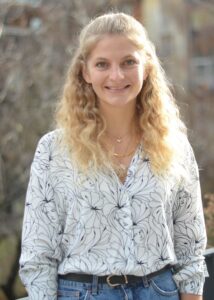
Anja Brems
Redakteurin

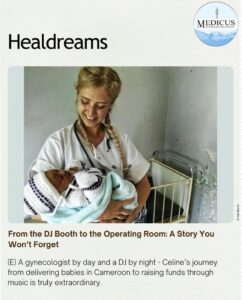
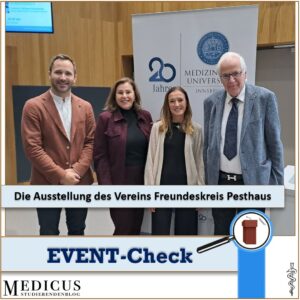

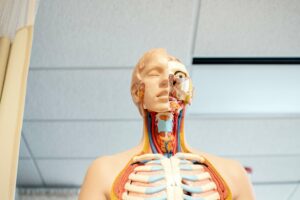
Thanks for this wonderful article. One other thing is that almost all digital cameras come equipped with a new zoom lens so that more or less of your scene being included by way of ‚zooming‘ in and out. Most of these changes in {focus|focusing|concentration|target|the a**** length will be reflected from the viewfinder and on massive display screen on the back of the camera.